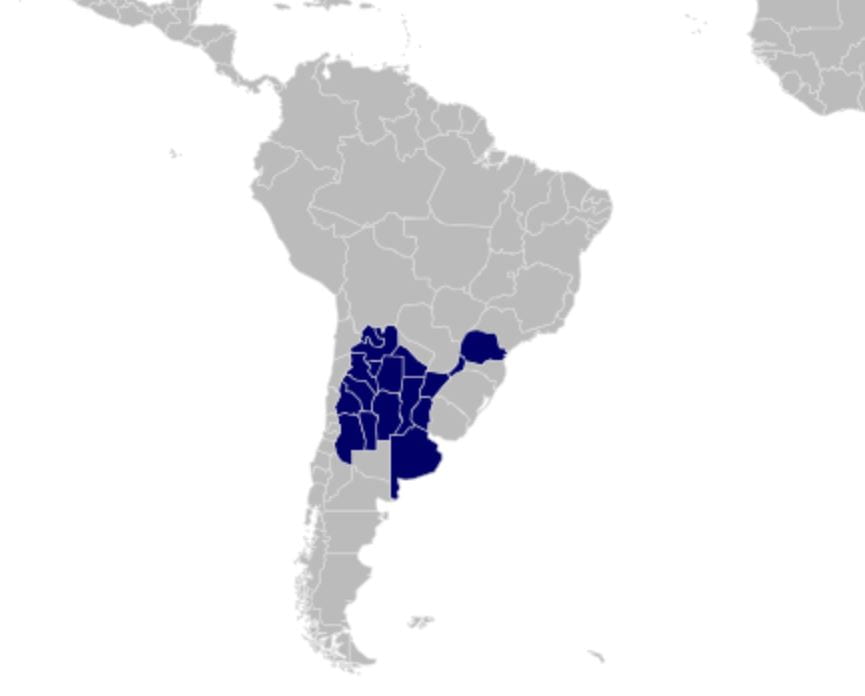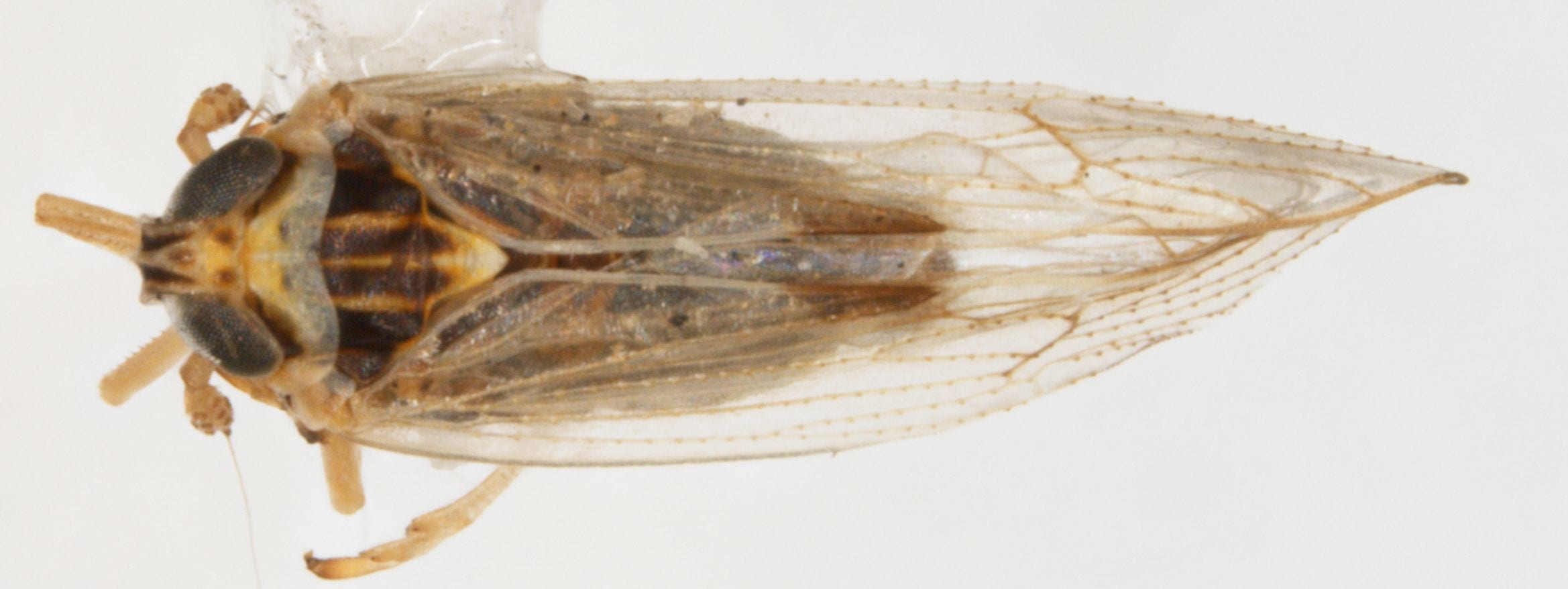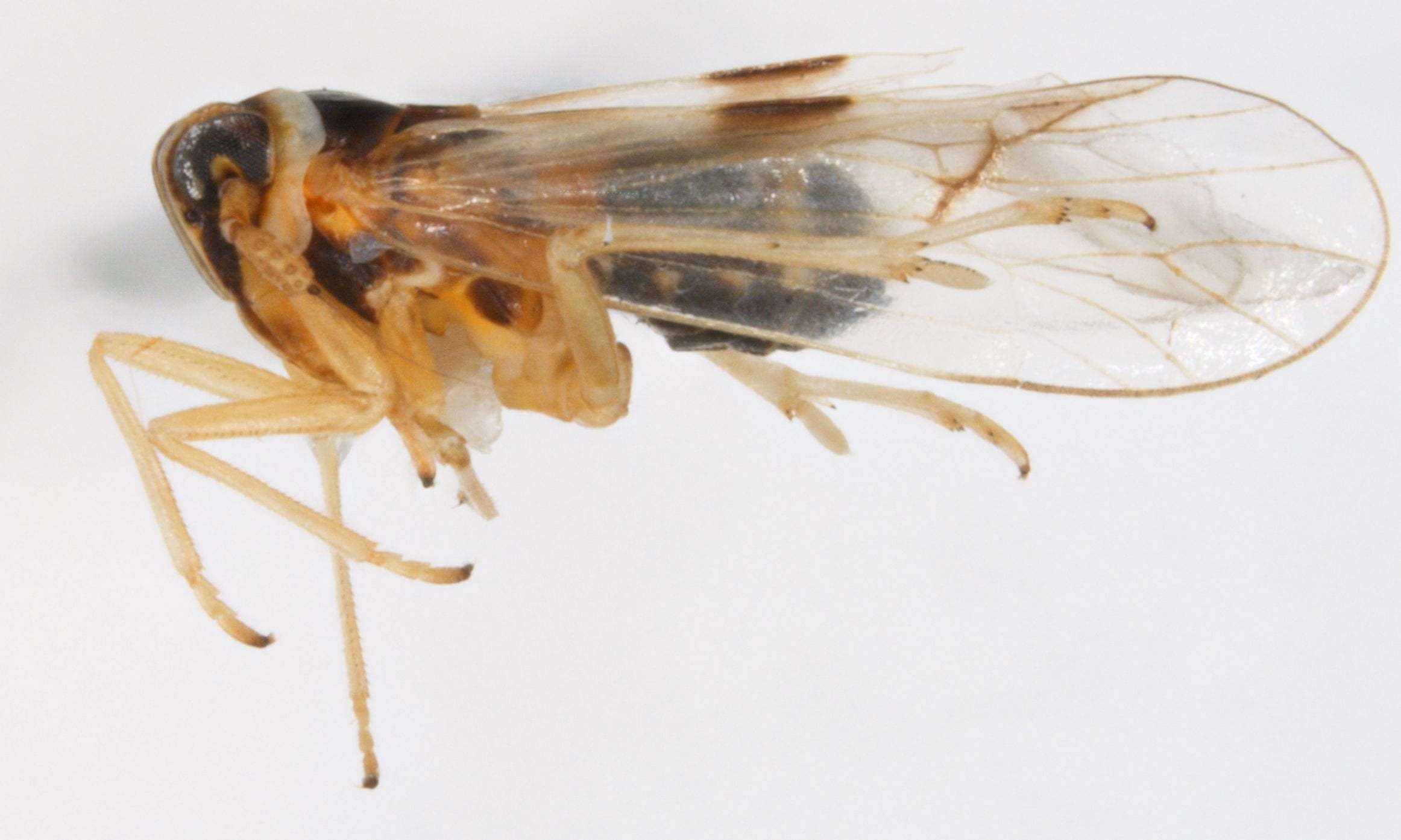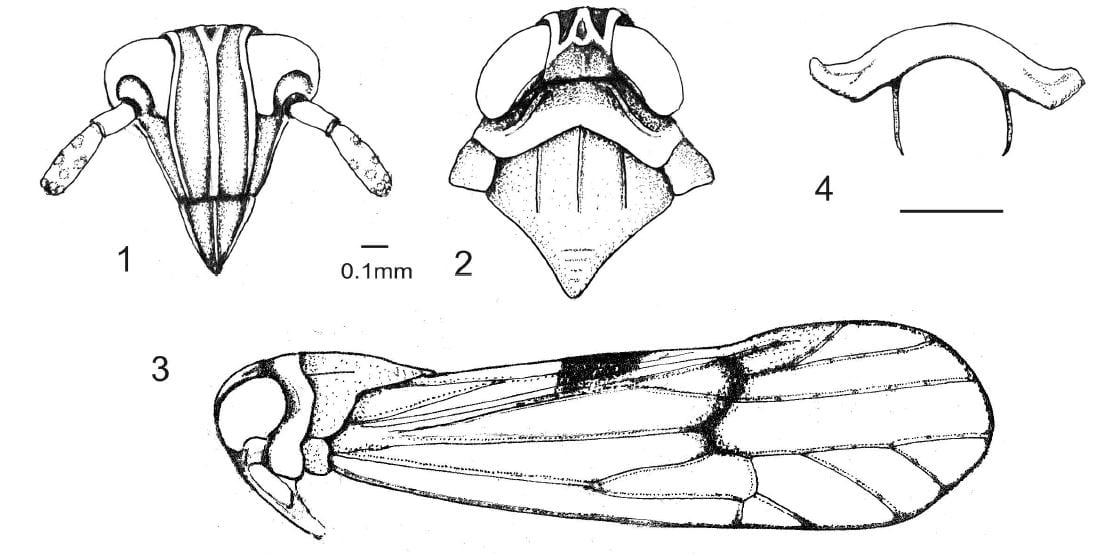[Back to Higher classification of Delphacidae]
[Back to A checklist of New World delphacid species]
Contents
Family Delphacidae Leach, 1815
Subfamily Delphacinae Leach, 1815
Tribe Delphacini Leach, 1815
Genus Pyrophagus de Remes Lenecov and Varela, 2014
Type species: Pyrophagus tigrinus de Remes Lenecov and Varela, 2014
Note: use of this name by Velazquez et al. (2006) and subsequent works (e.g., abstracts) are nomen nudum for this species.
Distribution
Argentina (Buenos Aires. Catamarca, Chaco, Corrientes, Córdoba, Entre Ríos, Jujuy, La Rioja, Mendoza, Misiones, San Juan, San Luis, Salta, Santa Fe, Santiago del Estero and Tucumán); Brazil (Paraná and Goias); Uruguay.
Recognized species
The name Pyrophagus tigrinus was reported by Velazquez et al. (2006) as a vector of Mal de Río Cuarto virus (MRCV) in Maize (and possibly other grasses). The authors cited Remes Lenicov & Varela in press with respect to this name; however, a description of the species has yet to be published. The species was subsequently described in de Remes Lenikov and Varela (2014)
Plant associations
Grasses, reported by de Remes Lenicov and Varela (2014):
Oat – Avena sativa L.
Barley – Hordeum vulgare L.
Maize – Zea mays L.
Alepo sorghum (Johnsongrass) – Sorghum halepense L.
Triticale – X Triticosecale Wittmack
Wheat – Triticum aestivum L.
Grama Rhodes – Chloris gayana Kunth
Gatton Panic – Urochloa maxima (Jacq.) R. Webster (guineagrass) as Panicum máximum L. cv. Gatton panic
Weeping lovegrass – Eragrostis curvula (Schrad.) Ness
Hairy crabgrass – Digitaria sanguinalis (L.) Scop.
Most of these plants have been demonstrated as host reservoirs of MRCV (Lenardón et al., 1997; Truol et al., 2001; Laguna et al 2002). Field studies have shown that its populations abruptly increase during summer on wheat and also on several wild grasses in cultivated maize areas affected by MRCV
Hosts from de Remes Lenicov and Varela (2014). Links to USDA PLANTS.
Economic Importance
This species was reported as a vector of Mal de Río Cuarto virus (MRCV, Fijivirus).
Recognition
Remarks from de Remes Lenicov and Varela (2014)
Regarding the genus
Pyrophagus shares a few features with other Neotropical Delphacini. It resembles Euides Fieber, 1866 and Tarophagus Zimmerman, 1948 in the following characters: the pygofer bearing ventral median process; the aedeagus with paralleled sides and ending in spinose process; and the anal segment armed. Pyrophagus can be distinguished from Euides by the vertex comparatively shorter, with the submedian carina meeting acuminately just anterior to the fastigium; carination on frons distinctive and noticeably contrasting in color; the male genitalia with well-developed diaphragm; suspensorium short and the anal segment with the processes basally separated. Females of Pyrophagus resemble those of Tarophagus species in the basal inner projection of valvifer VIII but can be separated from latter by the lack of the distinctive longitudinal
Regarding the species
“This new species can be easily recognized by the following characters: prothorax and abdomen blackish with yellow-cream marks; mesonotum uniformly dark; vertex subquadrate, rounded to frons in profile; male genitalia with pygofer with medioventral process strong, diaphragm uniformly wide and caudally produced, suspensorium short and aedeagus dorsocaudally directed and ending in a strongly reflexed, spinose process; and valvifers VIII in female basally expanded. Pyrophagus tigrinus resembles Delphacodes puella (Van Duzee, 1897) in the carination on head, color of pronotum and abdomen, and the markings and venation of fore wings, but differs from the latter in its vertex subquadrate, not projecting beyond the level of the eyes; antennae and legs longer; tegulae and mesonotum uniformly dark; and the shape of genitalia.”
Pyrophagus tigrinus (Photos by Kimberly Shropshire, University of Delaware)
Figure from De Remes Lenikov and Verela 2014
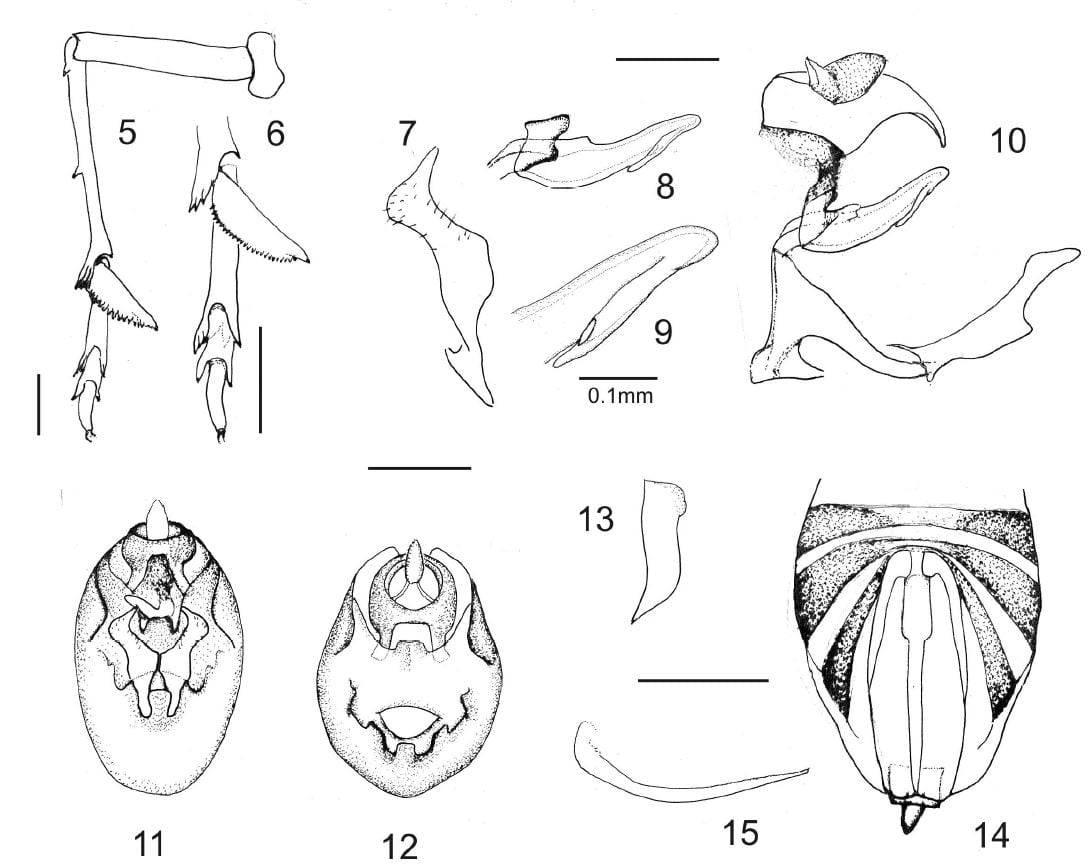
FIGURES 1–14 (from De Remes Lenikov and Verela 2014 ). Pyrophagus tigrinus 1, head, frontal view; 2, head and thorax, dorsal view; 3, habitus, lateral view; 4, 2nd sternal apodemes; 5, hind leg; 6, metatibial spur; 7, left paramere, posterior view; 8, aedeagus, lateral view (left side); 9 tip of aedeagus; 10, genitalia without pygofer, lateral view (left side); 11, genitalia, ventrocaudal view; 12, pygofer and anal segment, caudal view; 13, valvifer VIII, ventral view (left side); 14, tip of abdomen, ventral view; 15, gonapophysis IX, left lateral view. (scale bars in Figs 1, 2 and 9, = 0.1 mm; scale bars in other figures = 0.5 mm).
Molecular resources
none.
Select references
De Oliveira, C., E. De Oliveira, I. De Souza, E. Alves, W. Dolezal, S. Paradell, A. M. M. De Remes Lenicov and M. Regina Frizzas. 2013. Abundance and species richness of leafhoppers and planthoppers (Hemiptera: Cicadellidae and Delphacidae) in Brazilian maize crops. Florida Entomologist 96(4) 1470-1481. Retrieved from http://www.jstor.org/stable/23609185
Laguna, G., A.M.M. de Remes Lenicov, E. Virla, A. O. Avila, M. P. Gimenez Pecci, P. Herrera, J. Garay, D. Ploper and R. Mariani. 2002. Difusión del virus del Mal de Río Cuarto (MRCV) del maíz, su vector, delfácidos asociados y huéspedes alternativos en la Argentina. Revista de la Sociedad Entomológica Argentina 61 (1–2): 87–97.
Leach, W. E. 1815a. Entomology. The Edinburg encyclopedia; conducted by David Brewster 9: 57-172. (family Delphacidae here).
Lenardon, S. L, G. J. March, J. E. Beviacqua, A. Marinelli, J. A. Ornaghi amd E. M. Astorga. 1997. Diferentes épocas de siembra y cultivares de maíz como una alternativa para disminuir la incidencia del maize rough dwarf virus (MRDV) agente causal del “Mal de Río Cuarto”. IDIA, INTA 441–444, 78–83.
de Remes Lenicov, A.M. Marino and G. Varela. 2014. A new genus and species of Delphacini (Hemiptera: Fulgoroidea: Delphacidae) from Argentina. Zootaxa 3861(2): 177-184. http://dx.doi.org/10.11646/zootaxa.3861.2.5
Truol, G. A., T. Usugi, J. Hirao, J. Arneodo, M. P. Gimenez Pecci and I. Laguna. 2001. Transmisión experimental del virus del Mal de Río Cuarto (MRCV) por Delphacodes kuscheli. Fitopatologia Brasileira 26: 39–44. http://dx.doi.org/10.1590/s0100-41582001000100007
Velazquez, P. D.; F. A. Guzmán, L. R. Conci, A.M.M. de Remes Lenicov and G. A. Truol. 2006. Pyrophagus tigrinus Remes Lenicov & Varela (Hemiptera: Delphacidae), nuevo vector del Mal de Río Cuarto virus (MRCV, Fijivirus) en condiciones experimentales. Agriscientia (Córdoba) 23(1): 9-14.

